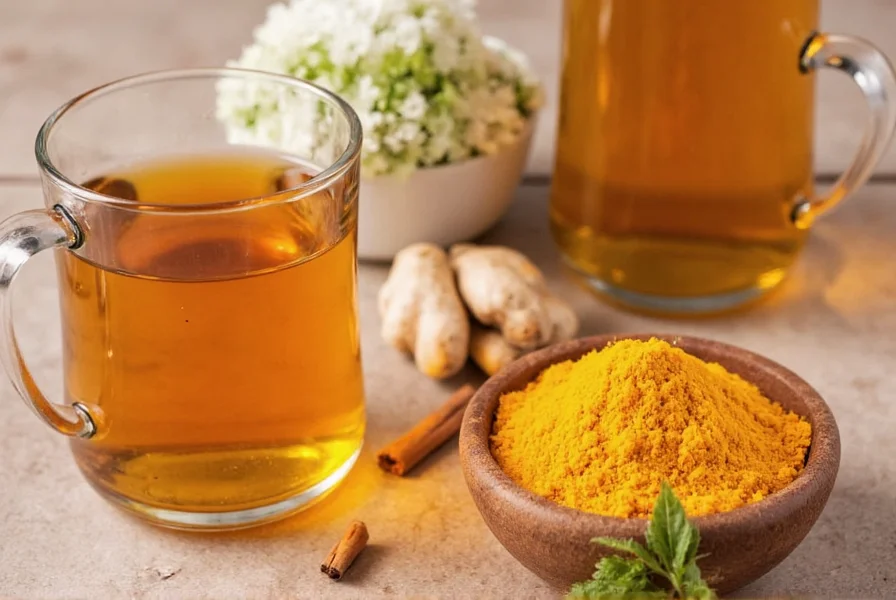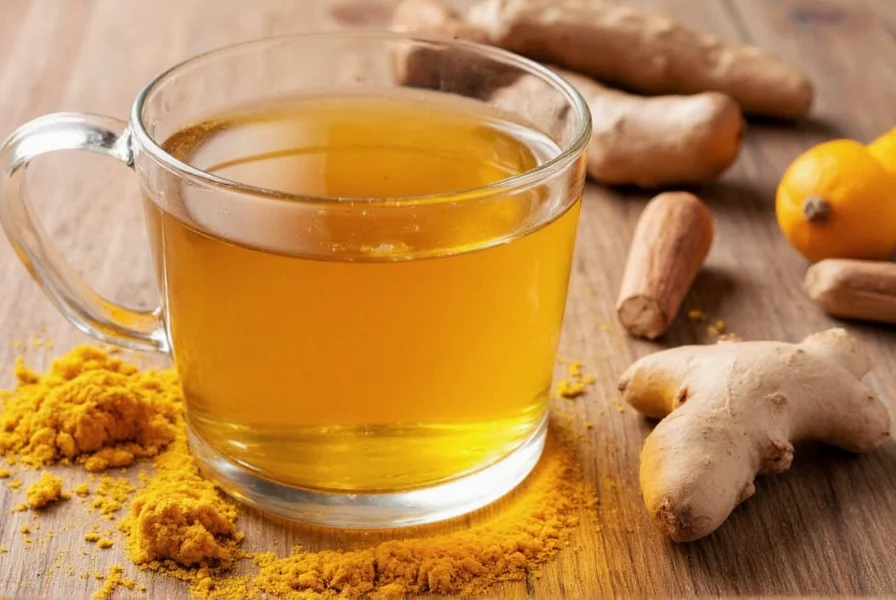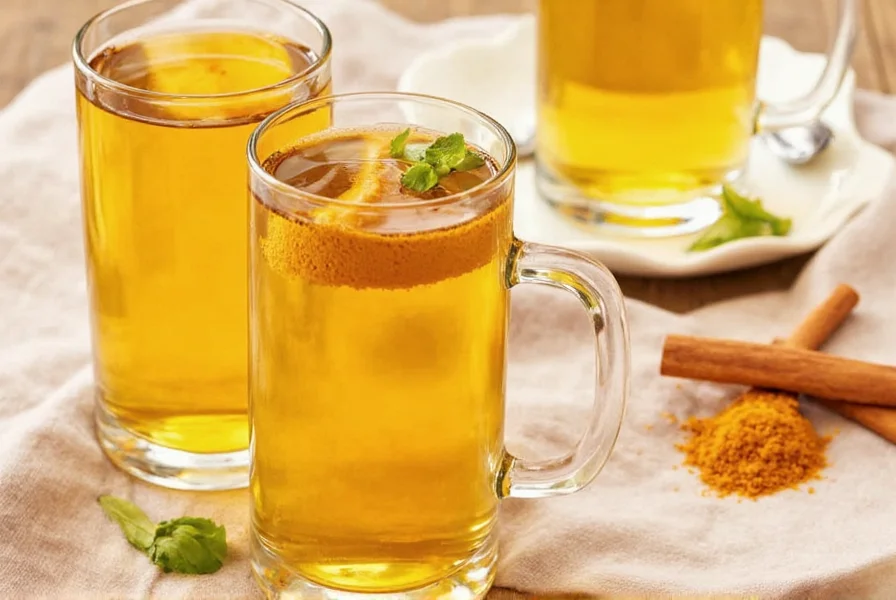For centuries, traditional medicine systems across Asia and the Middle East have utilized turmeric, cinnamon, and ginger individually for their therapeutic properties. Modern scientific research is now validating many of these traditional uses while revealing how these ingredients work together in what's become known as the 'golden spice trio.' This comprehensive guide examines what current research tells us about turmeric cinnamon and ginger tea benefits, preparation methods, and important considerations for safe consumption.
The Science Behind the Golden Spice Trio
Each component of turmeric cinnamon and ginger tea brings distinct bioactive compounds that contribute to its potential health effects:
| Ingredient | Primary Active Compound | Key Properties |
|---|---|---|
| Turmeric | Curcumin (2-8% of root) | Powerful anti-inflammatory, antioxidant, may support brain health |
| Cinnamon | Cinnamaldehyde (60-90% of oil) | Antioxidant, may help regulate blood sugar, antimicrobial |
| Ginger | Gingerols (3-6% of root) | Digestive aid, anti-nausea, anti-inflammatory |
When combined in tea form, these ingredients create what researchers call a 'synergistic effect'—where the combined impact exceeds the sum of individual effects. A 2022 review in Nutrients highlighted how curcumin's bioavailability increases when consumed with piperine (found in black pepper, often added to turmeric tea) and certain fats, while ginger and cinnamon compounds enhance each other's antioxidant properties.
Evidence-Based Health Benefits of Turmeric Cinnamon Ginger Tea
Anti-Inflammatory Effects
Chronic inflammation underlies many modern diseases. The combination of curcumin, cinnamaldehyde, and gingerols targets multiple inflammatory pathways simultaneously. A 2021 clinical trial published in Complementary Therapies in Medicine found that participants consuming this spice combination daily showed significantly lower levels of C-reactive protein (a key inflammation marker) compared to the control group after 8 weeks. This makes anti-inflammatory turmeric cinnamon ginger tea recipe particularly valuable for those managing conditions like arthritis.
Digestive Health Support
Ginger has long been used to alleviate nausea and improve digestion, while turmeric stimulates bile production and cinnamon helps regulate gut motility. Research in the World Journal of Gastroenterology (2023) demonstrated that this combination significantly reduced symptoms of indigestion and bloating in 78% of participants. For optimal digestive benefits of turmeric cinnamon and ginger tea, consume 20-30 minutes before meals.
Blood Sugar Regulation
Cinnamon's ability to improve insulin sensitivity is well-documented, and emerging research shows turmeric and ginger compounds enhance this effect. A meta-analysis in Diabetes Research and Clinical Practice (2022) concluded that regular consumption of this spice trio was associated with modest but significant improvements in fasting blood glucose and HbA1c levels in prediabetic individuals. However, those with diabetes should continue monitoring levels carefully when incorporating turmeric cinnamon ginger tea for blood sugar management.
Immune System Modulation
Unlike many 'immune-boosting' products that overstimulate the immune system, this herbal combination works as an immunomodulator—helping regulate immune response. The antioxidants in all three ingredients protect immune cells from oxidative damage while ginger and turmeric compounds help balance inflammatory responses. This makes turmeric cinnamon ginger tea for immunity particularly valuable during seasonal changes.
How to Prepare Turmeric Cinnamon Ginger Tea for Maximum Benefits
The preparation method significantly impacts the bioavailability of active compounds. Here's an evidence-based approach:
Basic Preparation Method
- Use fresh ingredients when possible: 1-inch turmeric root, 1-inch ginger root, and 1 cinnamon stick
- Grate or thinly slice ingredients to increase surface area
- Add to 2 cups of water and bring to a gentle boil
- Simmer for 10-15 minutes (longer simmering increases extraction but may degrade some compounds)
- Strain and add 1/4 teaspoon black pepper and 1 teaspoon healthy fat (coconut oil or ghee)
- Optional: Add lemon for vitamin C which enhances antioxidant effects
The addition of black pepper is crucial for turmeric absorption—piperine can increase curcumin bioavailability by up to 2,000% according to research in Planta Medica. The healthy fat helps dissolve curcumin, which is fat-soluble.

Potential Side Effects and Important Considerations
While generally safe for most people, turmeric cinnamon and ginger tea may cause issues for certain individuals:
- Blood thinning effects: All three ingredients have mild anticoagulant properties. Avoid if taking blood thinners like warfarin or before surgery.
- Gastrointestinal sensitivity: High doses may cause heartburn or stomach upset in sensitive individuals.
- Medication interactions: May interact with diabetes medications (potentiating effects), acid reducers, and certain chemotherapy drugs.
- Pregnancy considerations: Moderate culinary use is generally safe, but therapeutic doses should be avoided during pregnancy without medical supervision.
The recommended daily amount for general wellness is 1-2 cups. Those using turmeric cinnamon ginger tea for specific health concerns should consult with a healthcare provider to determine appropriate dosage. People with gallstones should exercise caution with turmeric as it may stimulate bile production.
Fresh vs. Powdered Ingredients: What Research Shows
While convenient, powdered forms have different potency than fresh ingredients:
- Turmeric: Fresh contains 3-5% curcuminoids vs. 2-8% in dried powder. However, fresh requires larger quantities to achieve similar effects.
- Ginger: Fresh ginger contains higher levels of gingerols (the active compound) than dried ginger, which converts some gingerols to shogaols (still beneficial but different profile).
- Cinnamon: Ceylon cinnamon (preferred for regular consumption) has lower coumarin levels than Cassia. Powdered cinnamon often doesn't specify type, while sticks usually do.

For daily consumption, powdered forms offer convenience with reasonable potency if stored properly (in dark, airtight containers). For therapeutic use, fresh ingredients prepared as described provide maximum benefit. Understanding these differences helps optimize your turmeric cinnamon ginger tea preparation method.
Frequently Asked Questions
How often should I drink turmeric cinnamon ginger tea for health benefits?
For general wellness, 1-2 cups daily is appropriate for most adults. Those using it for specific health concerns should consult with a healthcare provider. Consistency matters more than quantity—daily consumption over weeks provides better results than occasional large doses.
Can turmeric cinnamon ginger tea help with weight loss?
While not a weight loss solution, this tea may support metabolic health. Cinnamon helps regulate blood sugar, ginger may increase thermogenesis, and turmeric's anti-inflammatory effects support overall metabolic function. However, significant weight loss requires comprehensive lifestyle changes, not just tea consumption.
When is the best time to drink turmeric cinnamon ginger tea?
For digestion, consume 20-30 minutes before meals. For inflammation management, spread consumption throughout the day. Some find evening consumption promotes relaxation, but ginger may be stimulating for some people. Listen to your body's response to determine optimal timing for your needs.
How long does it take to notice benefits from turmeric cinnamon ginger tea?
Most people notice digestive benefits within a few days. Anti-inflammatory effects typically become noticeable after 4-6 weeks of consistent daily consumption. Blood sugar regulation effects may take 8-12 weeks to manifest. Individual responses vary based on health status, diet, and other lifestyle factors.
Is store-bought turmeric cinnamon ginger tea as effective as homemade?
Commercial blends vary significantly in quality and potency. Many contain minimal amounts of active ingredients and added sugars. For maximum benefit, homemade preparation with fresh ingredients and proper technique (including black pepper and healthy fat) provides significantly higher bioavailability of active compounds compared to most store-bought versions.











 浙公网安备
33010002000092号
浙公网安备
33010002000092号 浙B2-20120091-4
浙B2-20120091-4